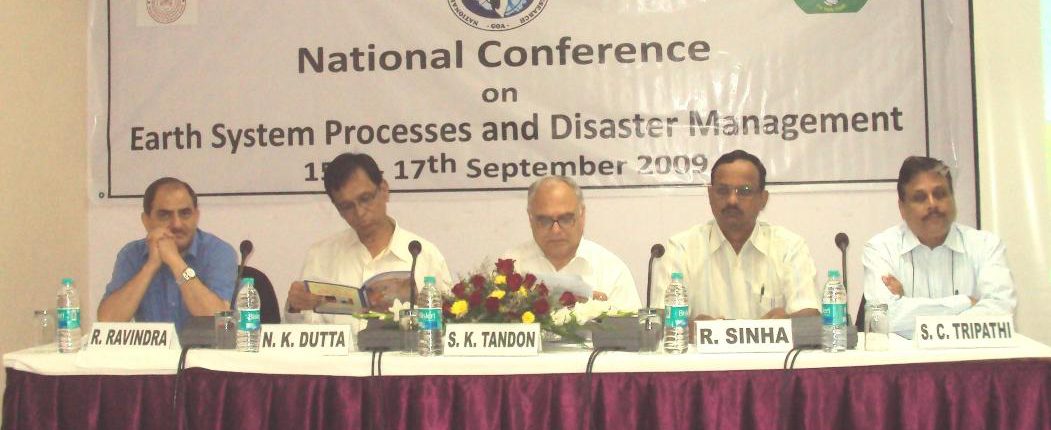SES Goa Conference

National Conference on ‘Earth System Processes and Disaster Management’
15- 17 September,2009 Goa
Recommendations
National Conference on ‘Earth System Processes and Disaster Management’ was held at International Centre, Goa during 15- 17 September,2009 under the auspices of The Society of Earth Scientists, NCAOR, Goa and IIT, Kanpur. About 60 delegates from different organizations belonging to BSIP, CESS, CGS (WIHG), DST, GSI, INCOIS, NIRM, NCAOR, IIT/K, NIO, NIH, NGRI, NRSC, NBSS, and different Universities participated. The gathering covered almost all the disciplines which come under the Earth System Sciences. In all, 25 papers and 15 short presentations were made in 7 different sessions in the conference.
The focus was to understand Earth processes and disaster management with special emphasis on climate change. The conference was inaugurated by Prof. S. K. Tandon, Pro- Vice Chancellor, Delhi University, an eminent earth scientist. In his inaugural address he covered natural climate change and climate variability from inter-annual to millennium scale emphasizing the dynamics of the coupled climate system which is likely to be disturbed by anthropogenic factors. It would involve the climate system to a new equilibrium state endangering food security, water security, livelihood etc. In his address Prof. Tandon gave special focus on the sustainability of river system of India which has been a cradle of Indian civilization. He emphasized that the dwindling water resources of India would not be able to meet the requirement of rising population with higher standard of living and demands for water for intensive agriculture. He called upon the earth scientists to develop the strategy to meet the stress of water resources likely to develop in the climate change scenario and help government in proper policy formulation.
Dr. N K Dutta, Director General, Geological Survey of India emphasized the need of integration of multidisciplinary data to understand the processes which will be helpful in disaster mitigation.
After each session there were discussions in which scientists participated actively. There were several young scientists who also participated very enthusiastically, covering various multidisciplinary aspects of their studies.
Overall the National conference was highly successful. The participants thanked the Ministry of Earth Sciences for facilitating the conference and the organizers for making excellent arrangements.
The following recommendations emerged:
1. Earth system science in India, although being studied in isolated disciplines for over 100 years, is in a stage where an integrated approach is necessary to march in parallel with global development; particularly in relation to climate, hydrology, natural and water resources, agriculture, biodiversity etc. There is strength in different government organizations, research institutes and universities in different disciplines but an integrated approach would enhance India’s capabilities in sustainable development in the face of climate change and rising adverse impacts of disintegrated national development.
2. The Society for Earth Scientist has taken a good initiative to bring all the earth scientists under one umbrella of a professional society. The Society may continue to work vigorously towards integrating maximum effort in Earth Science and for this purpose different government department /ministries were requested to encourage the efforts of the Society.
3. The society for Earth Scientists should encourage collaborative research among individual scientists and organization in multidisciplinary areas.
4. Earth science has to focus on resource management for sustainable development. Society may also work towards connecting different research groups/ institutions involved in earth system research.
5. The Society may arrange an annual meeting in which papers of different disciplines may be presented. Some of their meeting may be organized jointly with other professional societies in India, dealing with different disciplines of earth sciences like, India Meteorological Society, Geological Society of India, Indian Geophysical Union etc.
6. Climate change is a multidisciplinary subject in which different components of climate system (atmospheric, geosphere, hydrosphere, cryosphere and biosphere) interact on different spatio – temporal scale. Climate impacts society in many meaningful manners and should becomes an important theme for integrating the efforts of earth scientists in India. Anthropogenic climate change is likely to impact on different societal areas including natural disaster management.
7. At the international level several new initiatives are developing, such as the Global Earth Observing Systems (GEOS), Earth System Science Partnership (ESSP), International Geosphere Biosphere (IGB), World Climate Research Programme (WCRP), Climate and Cryosphere (CLIC) etc. Indian community of earth scientists should take the opportunity to devote their labour to the underlying themes of these programs to work together for the new horizon of climate prediction on all spatio – temporal scale (Inter- annual to decadal; centennial of millennial scale) and adopting the approach of seamless prediction of the earth systems.
8. Society may take special effort to sensitize the young scientists about the challenges before earth system sciences. Their suggestion for participating in the march forwards should be encouraged.
9. These recommendations may be forwarded to MoES, ISRO, DAE, CSIR, DST, Ministry of Mines, Ministry of Water Resources, Ministry of Non- Conventional Energy etc.
10. To achieve success in earth science process understanding quantitative assessment is highly desirable. Earth science organizations may modernize their equipments.


